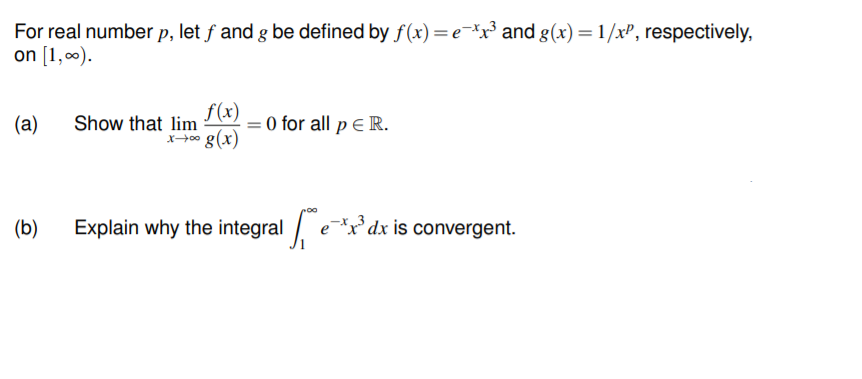For real number p, let f and g be defined by f(x) =e¯*x³ and g(x) = 1/xP, respectively, on [1,0). Show that lim (x) x+* g(x) (a) = 0 for all p E R. (b) Explain why the integral ex* dx is convergent.
For real number p, let f and g be defined by f(x) =e¯*x³ and g(x) = 1/xP, respectively, on [1,0). Show that lim (x) x+* g(x) (a) = 0 for all p E R. (b) Explain why the integral ex* dx is convergent.
Algebra & Trigonometry with Analytic Geometry
13th Edition
ISBN:9781133382119
Author:Swokowski
Publisher:Swokowski
Chapter10: Sequences, Series, And Probability
Section10.6: Permutations
Problem 47E
Related questions
Question
question 1)a)

Transcribed Image Text:For real number p, let f and g be defined by f(x) =e¯*x³ and g(x) = 1/xP, respectively,
on [1,0).
Show that lim (x)
x+* g(x)
(a)
= 0 for all p E R.
(b)
Explain why the integral ex* dx is convergent.
Expert Solution
This question has been solved!
Explore an expertly crafted, step-by-step solution for a thorough understanding of key concepts.
Step by step
Solved in 3 steps with 3 images

Recommended textbooks for you

Algebra & Trigonometry with Analytic Geometry
Algebra
ISBN:
9781133382119
Author:
Swokowski
Publisher:
Cengage


Algebra & Trigonometry with Analytic Geometry
Algebra
ISBN:
9781133382119
Author:
Swokowski
Publisher:
Cengage
